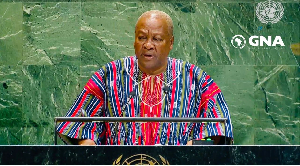Dr Daniel Ankrah, a Lecturer with the Department of Agriculture Extension at the University of Ghana Legon, has expressed worry about the rapid wanton conversion of arable lands for residential, commercial and industrial use to the detriment of large scale farming.
The situation, he said was gradually destroying activities of players along the agricultural value chain and diminishing vital ecosystem, which had negative implications on food and nutritional security.
Dr Ankrah also the founder of Mangrove an NGO, operating in the ten regions of Ghana, told the Ghana News Agency that, the activities of these private estate developers and sand winners were not environmentally friendly, which could contribute and derail the gains made in fighting global warming and climate issues in the country.
The Lecturer said a recent study has shown that the use of arable lands for construction and sand winning purposes has become a major concern among farmers in Akyemansa and Ayensuono districts in recent times, with the situation contributing to climate change as well as negative effects on biodiversity conservation.
“There is no enforcement and application of land use plan to guide land use decision, including awareness on the plan. Again, there is no land development guide for land leased or sold for industrial or construction purposes. The result is that majority of tenant and migrant farmers are being displaced and access to secured land for farming is being undermined.”
The Agricultural Extension Lecturer said land was the major driver of agriculture and with the current government's agenda of Planting for Food and Jobs, it was imperative for a proper land use management policy.
Dr Ankrah, who is also a livelihood expert said the Mangrove works in the areas of agriculture, food security, climate change & variability, gender, education, youth in agriculture and use of ICT in agriculture.
He said real estate development often took place in peri-urban rural setting, mostly farming communities, with most farmers displaced as a result of this human-led activities, leading to loss of livelihoods.
According to him, research reports by the Department of Agriculture (DoA) and other independent research bodies indicate that from 2002 to date, there has been massive conversion of arable agricultural lands into infrastructural developmental projects with its associated land litigation problems.
“A recent research conducted by Mangrove, showed that the situation is alarming and if necessary steps are not put in place, agricultural lands will be lost completely in the foreseeable future as it had started with Farmers within Ayensuano and Akyemansa districts, who are currently finding it difficult to get lands to farm.”, he added.
The Executive Director of Mangrove said the inability of farmers to have access to land for agricultural activities could have negative dire consequences on food security, adding that, “This condition is affecting livelihoods as well as food and nutritional security of farmers, both young and old are hastily losing their agricultural lands, livelihoods and agribusinesses.”
He stated that record showed that farmers, youth, and most women in the areas under the study who had lost their farm lands were redundant, thereby deepening the poverty levels of farmers.
Dr. Ankrah observed that lands acquired through the traditional authorities and Ghanaian middlemen were mostly obtained through verbal agreement without any contractual agreement or documentation, a phenomenon that also contributed to inevitable litigation.
“There is therefore the need to explore a viable alternative approach in minimizing the negative effects of land grabbing and sand winning in Akyemansa and Ayensuono districts in the Eastern region of Ghana through effective land use policy and management”, he added.
He said Mangrove, was supporting small scale farmers to increase their agricultural productivity and to approach farming as a business and make life meaningful and fulfilling. Mangrove embarks on livelihood diversification activities to reduce the risk of engaging in only one farm enterprise.
He said despite the fact that the assemblies had spatial and land use plans to guide land use decisions, administration and land allocation for different uses, chiefs and landowners give out large tracts of agricultural lands for other commercial, estates and industrial purposes without taking into account the rights, consent and approval from the farmers.
Dr Ankrah said the increased unregulated and massive sand winning activities as well as land grabbing in the Akyemansa and Ayensuono districts of the Eastern region had so far claimed 4000-5000 acres of fertile arable agricultural lands.
The financial gains in the conversion of vast acreage of farmlands into real estate and other industrial purposes have triggered massive sand winning activities.
The livelihood experts therefore called on chiefs and the district assemblies to be careful in the disposal of lands to avoid the rapid diminishing in the supply of agricultural lands.
Business News of Friday, 7 September 2018
Source: Mildred Siabi-Mensah













